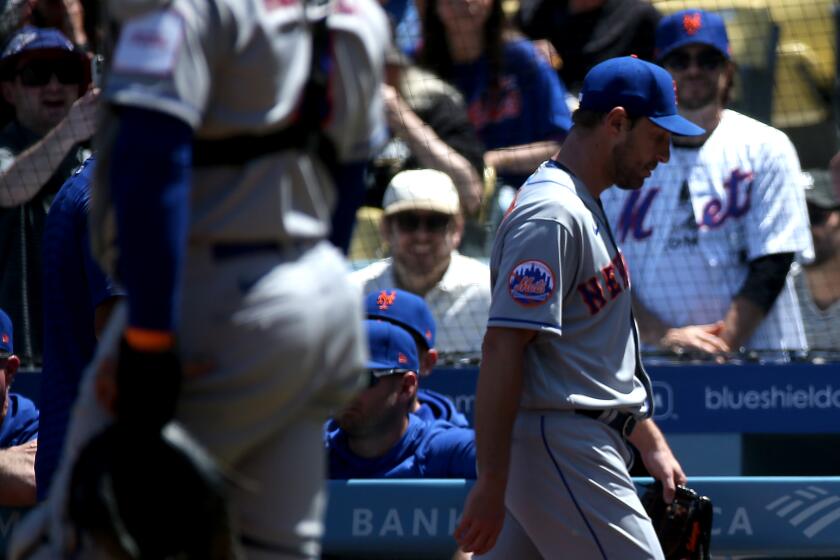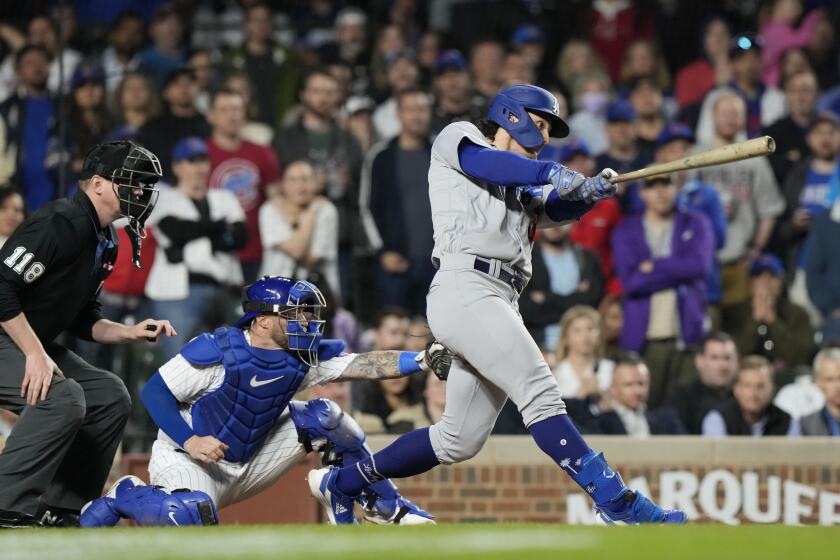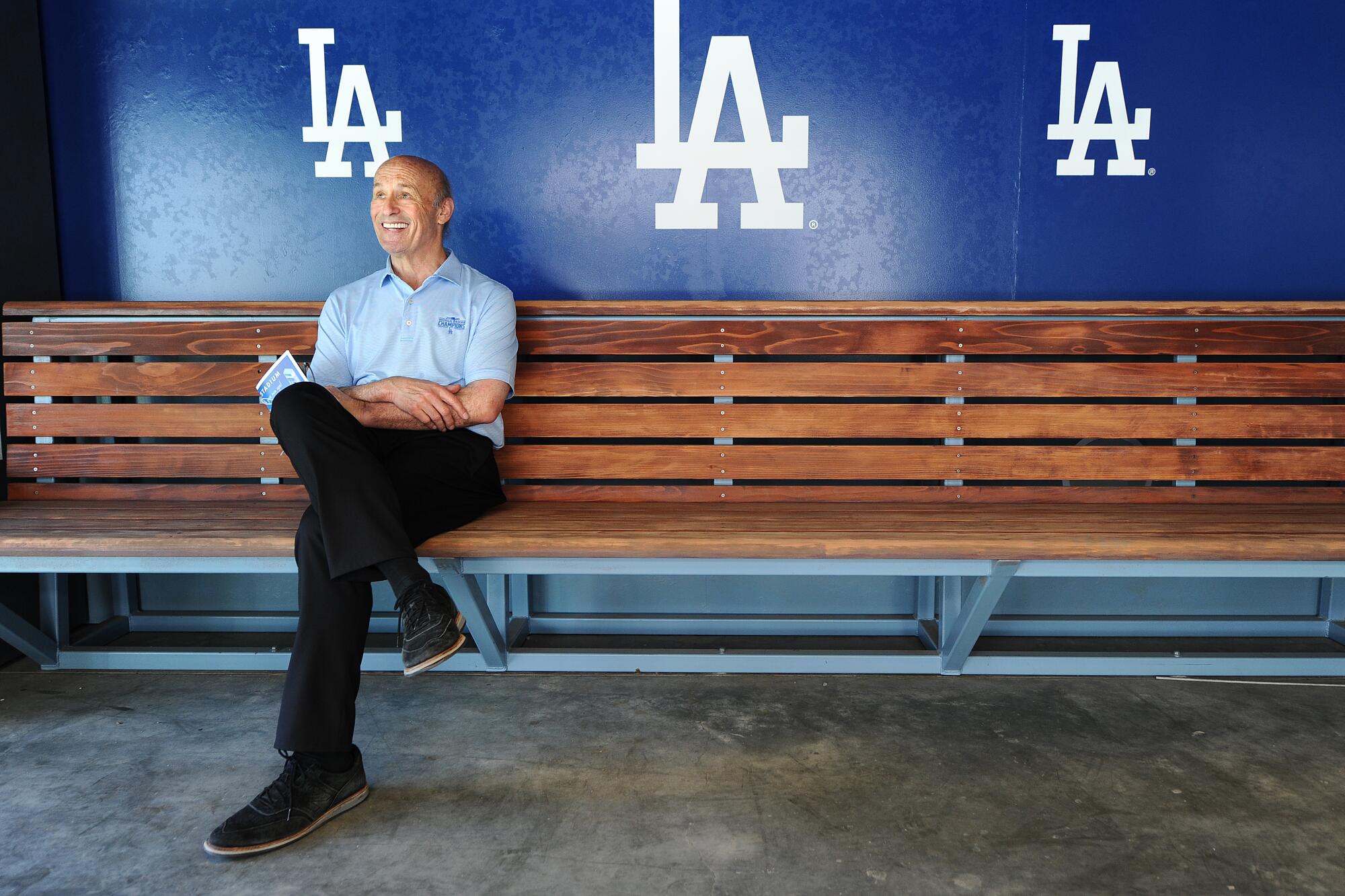
- Share via
As he milled around near the visitors’ dugout at Dodger Stadium on Monday night, Steve Cohen made a bigger on-field presence at Chavez Ravine than any Dodgers owner has all year.
In town to watch his surging New York Mets take two of three games against the struggling Dodgers, Cohen’s every move was followed by eyeballs and cameras.
He held court behind the plate during batting practice. He chatted up his players and staff when they walked by. He visited with prominent agent Scott Boras, spending several minutes with another of the sport’s biggest powerbrokers in plain sight.
It was a reflection of the hands-on, hyperaggressive reputation Cohen has cultivated since his $2.4-billion purchase of the club in 2020 — splurging on signings, smashing payroll records and seemingly prompting a league-wide free-agent binge this offseason.
Max Scherzer was ejected Wednesday for having a foreign substance on his hand. It was poetic justice after what happened with the Dodgers two seasons ago.
And compared to the hands-off, monitor-from-a-distance style of the Dodgers Guggenheim ownership group, and chairman Mark Walter especially, it highlighted the growing contrast between two of Major League Baseball’s marquee brands.
Cohen might be hoping to emulate the Dodgers’ long-term model of success, citing their decade-long run of dominance as an aspirational template for his own franchise.
But as the Mets continue to ascend, some observers around the industry (and growing factions of the Dodgers’ fanbase) have started to ask:
Should the Dodgers reevaluate their somewhat risk-averse approach to free agency and roster building?
Is it time for them to act a little more like Cohen?
According to Dodgers president Stan Kasten — the club’s top executive and primary link between ownership and day-to-day operations — the answer is apparently no, reiterating a conviction this week of the team’s current methods.
“We spent a lot of time analyzing where we are and where we want to be and what we have to do to get there,” Kasten said during an interview near the Dodgers’ home dugout. “We’re not swayed very much by what other teams are doing.”
It’s hard to fault him, or anyone else in the organization, for feeling that way.
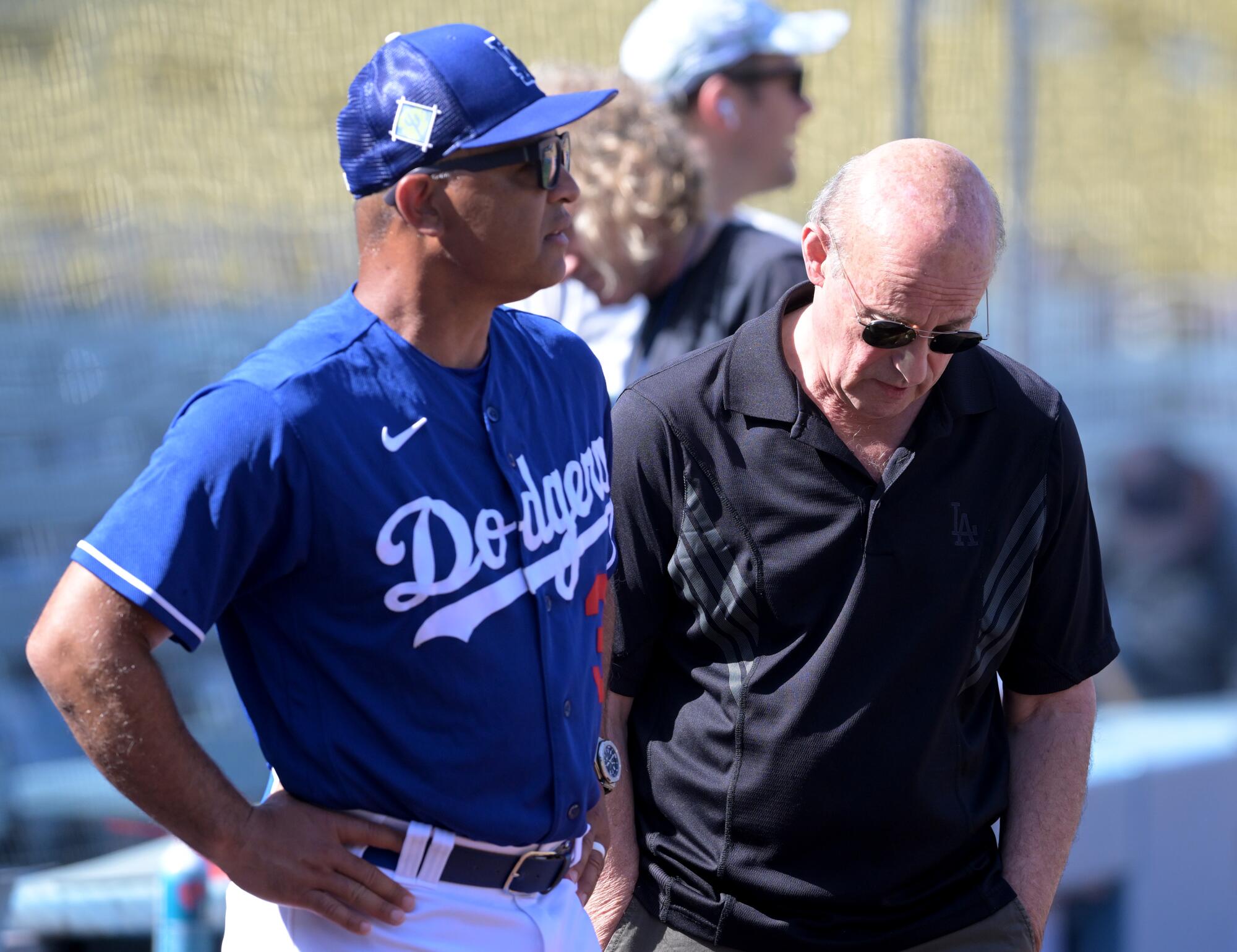
Though it has only resulted in one World Series championship, the Dodgers are still in the midst of a golden age.
They’ve won more games than any team over the last 10 years. They’ve produced nine division titles, three pennants and countless triumphant memories, bending the rest of the MLB universe to revolve largely around them.
There might have been a time they were viewed as baseball’s biggest economic bullies, back when the Guggenheim group poured hundreds of millions into the roster at the start of their stewardship of the franchise in 2012.
Since then, however, they’ve gradually relaxed that hefty financial muscle — taking into account the same future consequences (from luxury tax penalties to long-term salary obligations) that Cohen’s Mets are currently balking at.
“We have been both short-term and long-term,” Kasten said of the Dodgers’ approach. “We have been able to invest the resources we need to develop the long-term pipeline, as well as having a top payroll year in and year out. We do again this year. And I don’t foresee that changing.”
“That’s not a goal of ours, to get every year’s top guy,” Kasten said. “We try to do something reasonable that fills holes.”
— Stan Kasten, Dodgers president
The Dodgers remain one of baseball’s biggest spenders. They have a luxury tax payroll of roughly $250 million this year, according to Cot’s Baseball Contracts, putting them in line to pay tax penalties for a third straight time.
Yet, they also still act like a somewhat fiscally conservative franchise, especially in light of their myriad revenue streams and big-market advantages.
This season, for example, the Dodgers reduced what president of baseball operations Andrew Friedman had described as unsustainable levels of spending. They slashed more than $40 million from last year’s payroll. They built a reworked roster around younger and/or cheaper talent.
Cohen’s Mets, by comparison, pursued almost every big-name free agent this past offseason, netting major deals with Justin Verlander, Kodai Senga and Brandon Nimmo (not to mention Carlos Correa, whose signing fell through because of issues with his physical) that raised their payroll to an MLB-record $370 million.
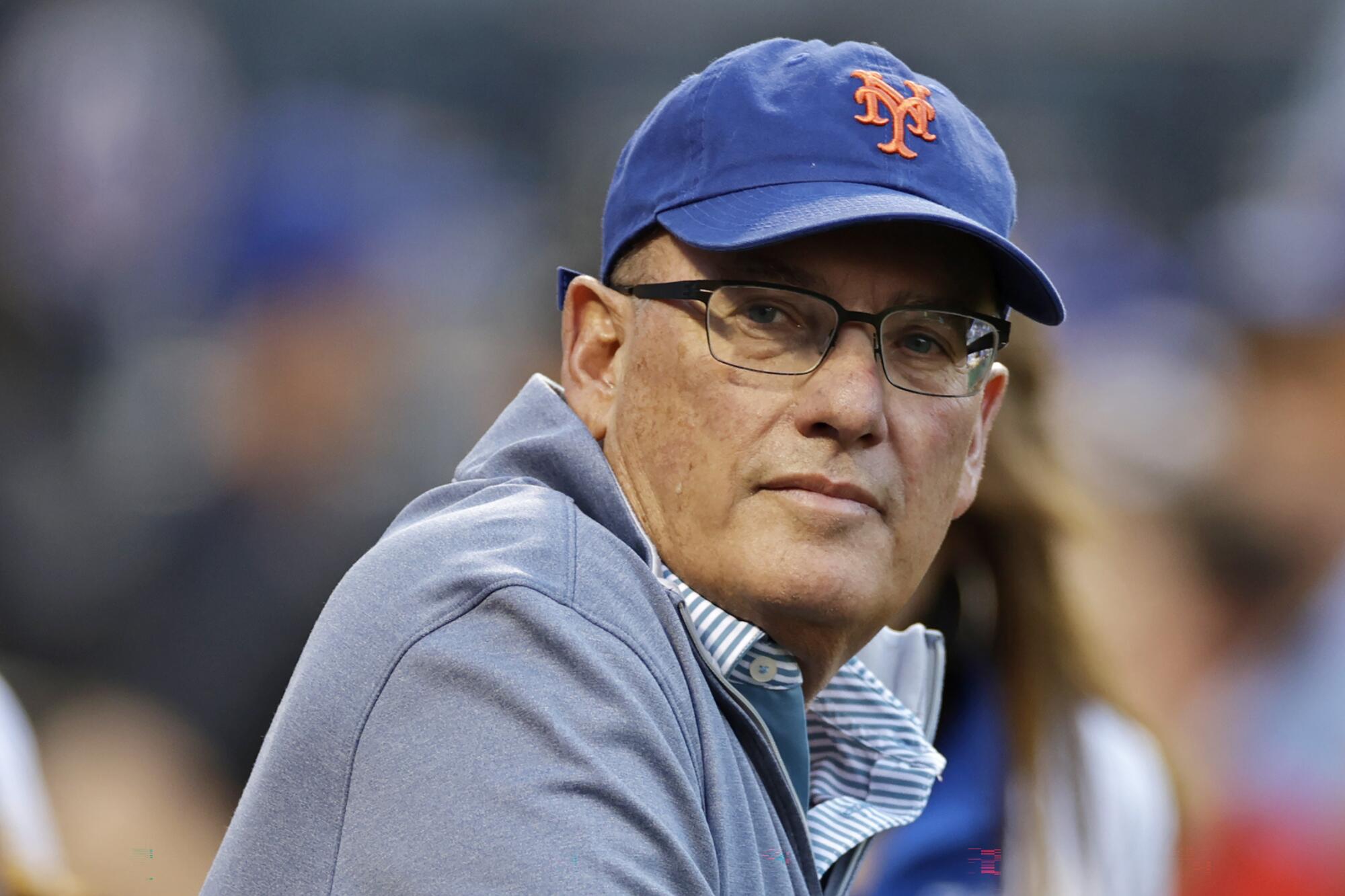
Other clubs seemingly mirrored those tactics too, with the New York Yankees, San Diego Padres and Philadelphia Phillies also surpassing the Dodgers in spending.
Yet, Kasten said his team will continue to do what it’s always done.
Add enough to remain a present-day contender, while maintaining the kind of financial flexibility they believe is critical to prolonged future success.
“We try to capture the interest of our fans, as well as being good on the field,” Kasten said. “We are blessed with a marketplace that allows us to do both.”
The Dodgers have indulged in big expenditures when they’ve felt it made sense — extending Mookie Betts for 12 years and $365 million, and signing Freddie Freeman to a six-year, $162-million contract.
They are also expected to make a run at Shohei Ohtani next winter, the two-way superstar who could net a record-breaking deal upwards of $600 million in free agency.
“I don’t think anything that any other team does is gonna change how we approach things.”
— Stan Kasten
But to this point, the club seems wary of an all-out attack on the free-agent market, sticking instead to their internal valuations of players and preference for shorter-term or deferral-laden deals.
It’s an ethos Kasten is adamant works for them.
“That’s not a goal of ours, to get every year’s top guy,” Kasten said. “We try to do something reasonable that fills holes. When we found an opportunity to [trade for] a Mookie Betts, it wasn’t a free agent, but we went and got him. When we had an opportunity to get a Freddie Freeman, we did. So there’s no hard-and-fast rule. If you do have hard and fast rules, I think that’s where you develop problems. We are flexible. We’ll look at all situations and consider where we are.”
Asked if that dynamic has been altered by the prevalence of new big-spenders such as the Mets or Padres — who under owner Peter Seidler went on their own spending spree this offseason — Kasten shook his head.
“I don’t think anything that any other team does is gonna change how we approach things,” he said, adding: “If we did that, maybe everything would [be about trying] to do what Tampa does [the Rays contend despite annually having one of baseball’s lowest payrolls]. I mean, you just can’t do it. You gotta do what makes sense for you, your team and your market and your system.
“So far,” the 12th-year Dodgers president added, “we’ve been pretty fortunate with how we’ve gone about building these teams.”
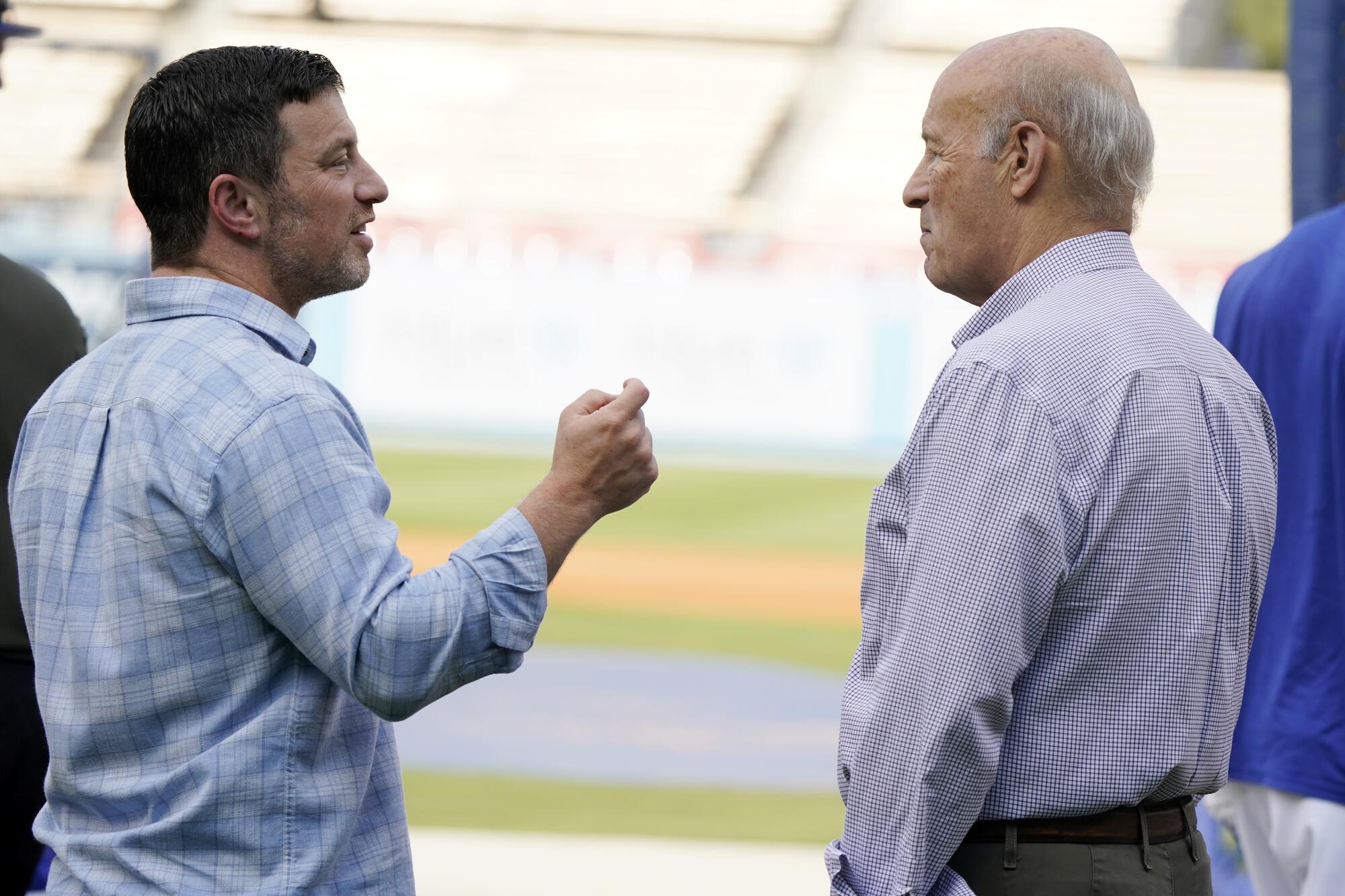
This season, of course, is threatening to reveal the downside of that process.
After an exodus of talent over the past several winters — Corey Seager, Trea Turner and Max Scherzer have headlined the stars to walk out the door — this year’s roster has looked diminished amid a sputtering 12-11 start.
It’s a step back the club was willing to make, enduring a potential reset season (though one they still believe carries World Series potential) in hopes of avoiding a more full-scale rebuild down the line.
They haven’t gone all-in like the Mets, Padres or other deep-pocketed contenders. They have work to do to remain in contention, with this week’s series loss to Cohen’s star-studded club serving as the latest sign.
Yet, they’re nonetheless bullish on their long-established processes; that, despite the rise of newer, bigger spenders, their long-term outlook will still remain bright.
“We’ve been pretty consistent that we are flexible, depending on the year,” Kasten said. “We were at a point in the cycle where we believed, and still believe, that we have a good group of younger players and wanted to leave room for them. But when there’s an opportunity to get a free agent that makes sense for us, both long-term and short-term, we do that as well.”
Rookie James Outman’s grand slam in the ninth inning broke a tie and lifted the Dodgers to a 6-2 win over the Chicago Cubs on Thursday in Chicago.
More to Read
Are you a true-blue fan?
Get our Dodgers Dugout newsletter for insights, news and much more.
You may occasionally receive promotional content from the Los Angeles Times.

